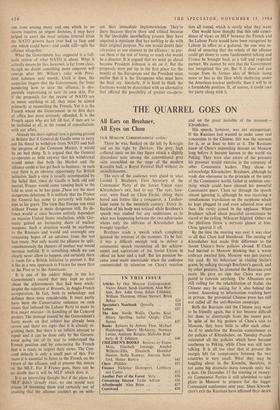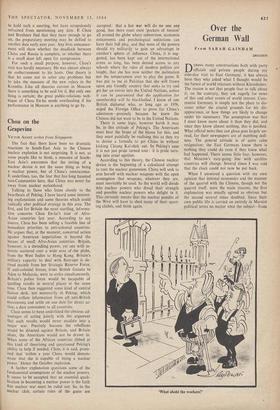THE QUARREL GOES ON
All Ears on Brezhnev, All Eyes on Chou
OUR MOSCOW CORRESPONDENT writes:
There he was, flanked on the left by Kosygin and on the right by Zhivkov. The grey, high collared tunic on his tiny figure struck a slightly discordant note among the conventional grey suits assembled on the stage of the modern Kremlin hall, a Royal Festival Hall without its embellishments.
The ears of the audience were glued to what Leonid I. Brezhnev, First Secretary of the Communist Party of the Soviet Union since Khrushchev's exit, had to say. The eyes, how- ever, were fixed on Chou En-lai, sitting there bored and listless like a conqueror, a Tambur- laine come to the twentieth century. Every in- flection of his body was noticed while Brezhnev's speech was studied for any undertones as to what was happening between the two adversaries whom only the oblivion of Khrushchev had brought together.
Brezhnev made a speech which completely ignored the tensions of the moment. To be fair, it was a difficult enough task to deliver a ceremonial speech recounting all the achieve- ments and aspirations of the Soviet Union in about an hour and a half. But his position be- came even more unenviable when the audience concentrated its attention on Chou's reaction and on the great invisible of the moment- Khrushchev.
His speech, however, was not unimportant. If the Russians had wanted to make some real concession to the Chinese, this was the moment for it, or at least to hint at it. The Russians knew of Chou's impending descent on Moscow long before it became known to the world via Peking. They were also aware of the pressure his presence would exercise in the company of other Communist leaders. They chose to acknowledge Khrushchev. Brezhnev, although he made due obeisance to the principle of the unity of the Communist world, failed to mehtion any- thing which could have pleased his powerful Communist guest. Chou sat through the speech almost ignoring it, although he was receiving a simultaneous translation on the earphone which he kept plugged in and even adjusted now and then. He rarely joined in the applause. When Brezhnev talked about peaceful co-existence he stared at the ceiling. Mikoyan fidgeted. Others on the platform threw a nervous glance at him. Chou ignored it all.
By the time the meeting was over it was clear to all that Chou had blundered. The ousting of Khrushchev had made little difference to the Soviet Union's basic policies abroad. If Chou had hurried to Moscow thinking that a warm embrace awaited him, Moscow was just correct but cool. By his behaviour in visiting Stalin's grave, by sulking through Brezhnev's speech, and by other gestures, he alienated the Russians even more. He gave no sign that China was pre- pared to concede anything. The Albanians are still calling for the rehabilitation of Stalin; the Chinese may be asking for it also behind the scenes. According to information reaching here in private, the provincial Chinese press has still not called off the anti-Russian campaign.
. Both the Russians and the Chinese may want to be friendly again, but it has become difficult for them to disentangle from the recent past. In spite of the big gesture of Chou's visit to Moscow, they have little to offer each other. As if to underline the Russian commitment to the policies of Khrushchev, on Tuesday Pravda reiterated all the policies which have become anathema to Peking, while Chou was still here talking. It is all too clear that at present the margin left for compromise between the two countries is very small. What they may be haggling about in the Kremlin, therefore, is not some big dramatic move towards unity but a date. On December 15 the meeting of twenty- six Communist Parties is still scheduled to take place in Moscow to prepare for the bigger Communist conference next year. Since Khrush- chev's exit the Russians have affirmed their desire to hold such a meeting, but have scrupulously refrained from mentioning any date. If Chou and likezhnev find that they have enough to go on, the preparatory meeting may be shifted to another date early next year. Any firm announce- ment will show whether the deadlock between China and Russia is complete, or whether there is a small door left open for compromise.
For such a small purpose, however, Chou's Visit was hardly necessary. He was almost always an embarrassment to his hosts. One theory is that he came not to solve any problems but to take the measure of the new rulers in the Kremlin. Like all theories current in Moscow there is something to be said for it. But only one thing is certain; the great public-relations tech- nique of Chou En-lai needs overhauling if his performance in Moscow is anything to go by.











































 Previous page
Previous page